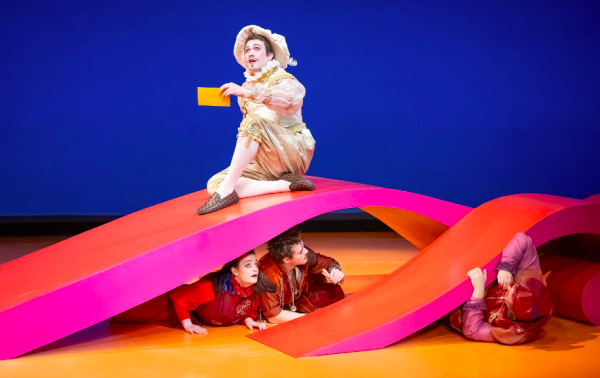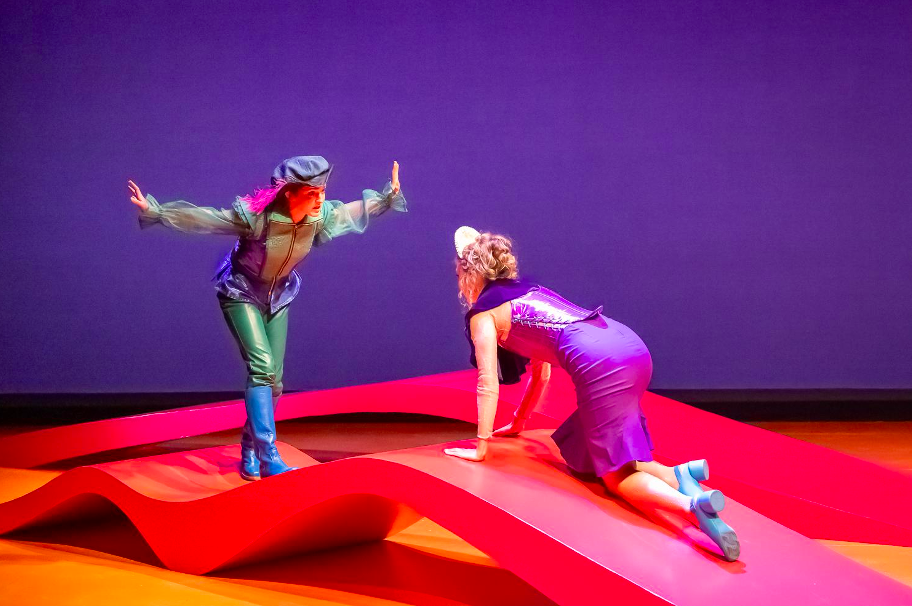The University of Massachusetts’ theater department put on a production of William Shakespeare’s comedy “Twelfth Night,” directed by Milan Dragicevich, professor of acting at UMass. It was staged at the Rand Theater in the Bromery Center for the Arts, running from April 26 to May 4.
“Twelfth Night” is one of Shakespeare’s most popular plays. “It has … kind of a magical, fable-like quality to the story that captures both a kind of family-reunion story with the crazy mishaps that happen with mistaken identities,” Dragicevich said. “Both romantic and philosophical … mishaps that can occur, are all within the magical environs of the fictional land of Illyria.”
“Twelfth Night” tells the story of twins Viola (portrayed by Beth Laine) and Sebastian (Walt Manasse-Latham), who are separated in a shipwreck and assume each other to be dead. Viola lands in the country of Illyria, where she disguises herself as a man named Cesario. She is delegated by the duke Orsino (Sam Patterson) to court the noblewoman Olivia (Anne Gallivan) on Orsino’s behalf. However, Olivia develops feelings for Viola/Cesario, whilst Viola herself falls for Orsino. Amid hijinks from characters including Olivia’s relative Sir Toby Belch (DJ Dragicevich), her maid Maria (Kitty Ryan) and Feste the Fool (Kaliska Wiley), Sebastian resurfaces and encounters Olivia, who mistakes him for Cesario, who is really Viola. The muddling of identities causes great confusion amongst the characters.
Dragicevich explained that although Shakespeare’s works relate to humanity, his vocabulary can be difficult for a contemporary audience to understand. Therefore, he sought to increase audience engagement by combining the play’s Elizabethan setting with contemporary dialogue, modernist costumes, a vibrant stage design and live music. He also emphasized the audience’s role in influencing the actors’ performance with their responses.
Music was key to the production, which comprised several dance routines such as Viola and Sebastian’s separation in the ocean, as well as a brief ballet performance by Viola and Feste. Original songs from the play, including Feste’s “Come Away, Death” and the closing number “Hey, Ho, The Wind and The Rain” – originally performed by just the Fool but this time sung all together by the cast – were performed enthusiastically. Dialogue between Feste, Sir Toby and his friend Sir Andrew Aguecheek (Cole Seitz) was synchronized with tunes including “So Long, Farewell” from “The Sound of Music,” “I Will Always Love You” by Whitney Houston and “Rollin’ In The Deep” by Adele. The music was directed and composed by acclaimed musician Tim Eriksen, who contributed to the soundtrack of the film “Cold Mountain” and is a member of Northampton band Cordelia’s Dad.
“I think Shakespeare’s original intent was to use music that reached the audience, and while … it could be really interesting to see what his original music sources were, for the purposes of the play, I think it makes more sense to use things that speak more directly to the audience,” Eriksen said, adding that his position in the corner of the stage allowed him to witness the audience’s reactions.
Beth Laine, a senior theater major and studio art minor, played the main role of Viola. She appreciated Viola’s perseverance in obtaining the life that she wants, which made the role relatable to her.

“I am so passionate and I go after what I love and what I want, with a very, very strong drive, and I think Viola does the same,” Laine said. Having been involved in theater department throughout her time at UMass, “Twelfth Night” was Laine’s first time acting in a Shakespeare production, a challenge that she accepted. She praised Dragicevich for making everyone involved in the production – cast, crew and the audience alike – feel included.
“I think, specifically, I wanted to work with Milan … and on Shakespeare before I graduated,” Laine said. “Last semester, I was lucky enough to be in Harley Erdman’s class of Neoclassical to Early Modern Repertoire, where we read a lot of Shakespeare plays … and those opened my eyes to plays that aren’t just modern.”
She continued, “I knew immediately, when I read it, that if I was to … be in it, I wanted to be Viola, so I think I might have been drawn to Viola specifically.”
Cole Seitz, a senior philosophy major and English and theater minor, portrayed comic character Sir Andrew, the bombastic but hapless suitor of Olivia and friend of Sir Toby.
“I really love [Sir Andrew’s] character,” Seitz said. “[Sir Andrew]’s very cowardly and naive and well-meaning, but … he wants to be one of the cool kids, like Sir Toby and the rest, but can’t quite hack it, so he’s sort of on the edges of this group, not knowing that he’s being made fun of, and there’s something really sad and sweet and beautiful about that.”
Seitz’s prior work in Shakespeare’s plays and studying under Dragicevich at UMass prepared him well for his role.
“I enjoy the unapologetic way that the play will have real moments of sincerity and depth and darkness, and boom … it’s craziness and silliness again, and it’s not trying to temper anything. It’s unapologetic in telling the story that it wants to tell. It’s also really imaginative and joyful, and it deals with some big questions of, ‘When does something go too far?’” Seitz said, citing Malvolio’s bullying from characters including Sir Andrew as a response to the question.
Dragicevich described the unbridled merriment of the Twelfth Night festival, which was celebrated in olden-day England, and how the sentiment powered the production.
“The Twelfth Night is the 12th day after Christmas in England, in which that day was a day of uncivil merriment, of throwing out all the rules and having fun and celebrating. That was the Twelfth Night in England – [it] was a day of just revelry, a day of letting your hair down, so to speak, and that energy is in the play that we are producing,” Dragicevich said.
Kalana Amarasekara can be reached at [email protected].



















